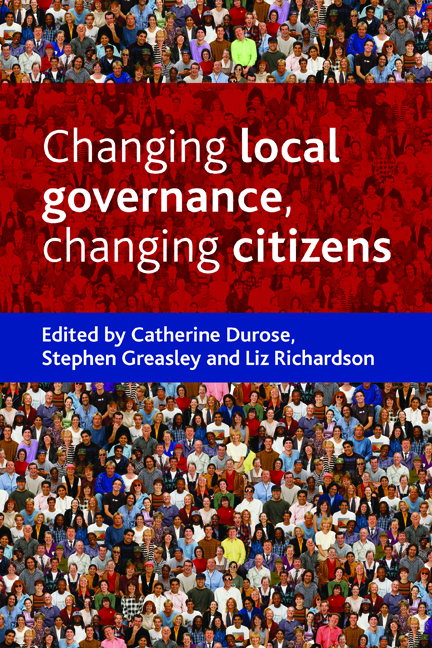Book contents
- Frontmatter
- Dedication
- Contents
- List of boxes and tables
- Acronyms
- Notes on contributors
- Acknowledgments
- Foreword
- Preface
- one Changing local governance, changing citizens: introduction
- two Citizen governance: where it came from, where it’s going
- three ‘Neighbourhood’: a site for policy action, governance … and empowerment?
- four Urban housing market restructuring and the recasting of neighbourhood governance and community
- five Citizen aspirations: women, ethnicity and housing
- six Can we promote cohesion through contact? Intergroup contact and the development of community cohesion
- seven New migrants, citizenship and local governance: ‘Poles’ apart?
- eight Citizens of faith in governance: opportunities, rationales and challenges
- nine Citizens’ reflections on behaviour change policies
- ten Every child’s voice matters?
- eleven e-citizenship: reconstructing the public online
- twelve Conclusion
- Index
twelve - Conclusion
Published online by Cambridge University Press: 16 July 2022
- Frontmatter
- Dedication
- Contents
- List of boxes and tables
- Acronyms
- Notes on contributors
- Acknowledgments
- Foreword
- Preface
- one Changing local governance, changing citizens: introduction
- two Citizen governance: where it came from, where it’s going
- three ‘Neighbourhood’: a site for policy action, governance … and empowerment?
- four Urban housing market restructuring and the recasting of neighbourhood governance and community
- five Citizen aspirations: women, ethnicity and housing
- six Can we promote cohesion through contact? Intergroup contact and the development of community cohesion
- seven New migrants, citizenship and local governance: ‘Poles’ apart?
- eight Citizens of faith in governance: opportunities, rationales and challenges
- nine Citizens’ reflections on behaviour change policies
- ten Every child’s voice matters?
- eleven e-citizenship: reconstructing the public online
- twelve Conclusion
- Index
Summary
The picture this collection paints is of a series of genuine attempts by different sorts of decision makers to fundamentally change the way that local areas are governed. The changes are designed to draw citizens in more closely towards the local state. The chapters illustrate that there are high stakes for decision makers in changing local governance in these ways. The public sector believes that it will not be able to govern effectively without the cooperation and active involvement of citizens. Reform is difficult, however, and governance stakeholders, particularly at the local level, do not have the capacity or resources to redress many of the biases in the system. The book shows how many gaps remain between citizens and governance structures.
This volume has sought to move beyond the often highly abstract debates around citizens and governance and examine the ‘practice’ of citizenship (Prior et al, 1995). Rather than looking at citizenship as a status that people possess, this text has focused on citizenship as a ‘practice’ that people engage in. By looking at the actual interactions between governance and citizens, we can better explore the implicit understanding of the nature and limits of citizenship.
This book has also attempted to unravel the language of citizenship. In the last two decades, a whole new language has emerged to try and describe and define the citizen–governance relationship. Terms such as ‘civicness’ and ‘co-production’ attempt to both describe change and influence the ways in which citizens act. By exploring contemporary interactions between citizens and governance we can begin to understand whether what is going on is simply rhetorical or something more substantive. The turn to governance has been much discussed but what is clear is that the ‘turn’ is an ongoing process and the rhetoric of citizen governance is not always matched by substance. While participation and empowerment are now concepts with significant currency there is clearly an ongoing tendency towards centralisation and standardisation. This raises the question of where is the citizen in this debate? In academic work, there has been a clear focus on the organisational impact of governance, but less on the demands now made of, and by, citizens and how citizens themselves reflect and respond to these changing demands.
- Type
- Chapter
- Information
- Changing Local Governance, Changing Citizens , pp. 211 - 224Publisher: Bristol University PressPrint publication year: 2009



